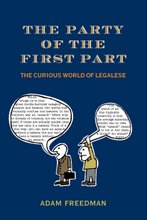It's murder coming up with a definition of torture -- or is the other way around?
New York Lawyer reports that Professor John Yoo (co-author of the infamous 2002 "torture memo") came to New York last week to defend his position that nothing short of "organ failure or . . . death" constitutes torture of alleged al Qaeda operatives by U.S. military interrogators.
Is he right? The criminal law that codifies the Convention Against Torture defines torture as "an act committed by a person acting under color of law specifically intended to inflict severe physical or mental pain or suffering (other than pain or suffering incidental to lawful sanctions) upon another person within his custody or physical control." At the very least, the bit about "mental" suffering seems to be broader -- assuming, of course, that al Qaeda operatives fall under the Convention's protections.
According to Stroud's Judicial Dictionary, no terrorist would be subject to torture. Stroud's entry for "torture" says simply "see Cruelty to Animals."
To be fair, Yoo's definition seems closer to the traditional idea of torture. Shumaker's Cyclopedic Dictionary of Law (1922) defines it as "Bodily pain or hurt inflicted with the object of compelling a disclosure of guilt or of knowledge in respect of a crime or its perpetrator. It was imposed by various means, and under sanction of law."
The Oxford English Dictionary defines "judicial torture" as "infliction of severe bodily pain, . . ., inflicted by a judicial or quasi-judicial authority, for the purpose of forcing an accused or suspected person to confess, or an unwilling witness to give evidence or information."
Incidentally, "torture" comes from the Latin root torquere (to twist), from which we get such useful words as torsion, torque -- and, of course, tort.
Sunday, April 29, 2007
Saturday, April 7, 2007
There's a new sheriff in town
A victory for plain language! The Securities and Exchange Commission has cited 40 companies for submitting reports that fail to meet the SEC's Plain English guidelines.
Among the gems cited by the SEC was a proxy statement that described performance-based compensation as being:
Read the full story
Among the gems cited by the SEC was a proxy statement that described performance-based compensation as being:
based on a multiple of the named executive's base salary in effect in February 2006 and the annual bonus awarded in February 2006 for the 2005 period. The potential payment in 2009 as a multiple of salary and bonus at February 2006, for each named executive, is .75X at threshold, 1.50X at target and 2.00X at maximum.Come again?
Read the full story
Subscribe to:
Comments (Atom)
